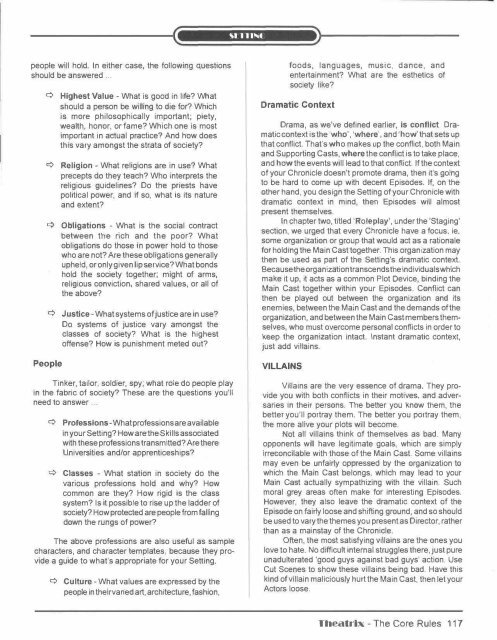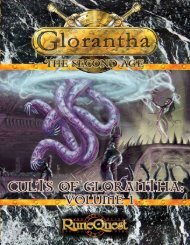Untitled - Index of - Free
Untitled - Index of - Free
Untitled - Index of - Free
You also want an ePaper? Increase the reach of your titles
YUMPU automatically turns print PDFs into web optimized ePapers that Google loves.
people will hold. In either case, the following questions<br />
should be answered ...<br />
¢ Highest Value - What is good in life? What<br />
should a person be willing to die for? Which<br />
is more philosophically important; piety,<br />
wealth, honor, or fame? Which one is most<br />
important in actual practice? And how does<br />
this vary amongst the strata <strong>of</strong> society?<br />
¢ Religion - What religions are in use? What<br />
precepts do they teach? Who interprets the<br />
religious guidelines? Do the priests have<br />
political power, and if so, what is its nature<br />
and extent?<br />
¢ Obligations - What is the social contract<br />
between the rich and the poor? What<br />
obligations do those in power hold to those<br />
who are not? Are these obligations generally<br />
upheld, or only given lip service? What bonds<br />
hold the society together; might <strong>of</strong> arms,<br />
religious conviction, shared values, or all <strong>of</strong><br />
the above?<br />
¢ Justice- What systems <strong>of</strong> justice are in use?<br />
People<br />
Do systems <strong>of</strong> justice vary amongst the<br />
classes <strong>of</strong> society? What is the highest<br />
<strong>of</strong>fense? How is punishment meted out?<br />
Tinker, tailor, soldier, spy; what role do people play<br />
in the fabric <strong>of</strong> society? These are the questions you'll<br />
need to answer ...<br />
¢ Pr<strong>of</strong>essions-What pr<strong>of</strong>essions are available<br />
in your Setting? How are the Skills associated<br />
with these pr<strong>of</strong>essions transmitted? Are there<br />
Universities and/or apprenticeships?<br />
¢ Classes - What station in society do the<br />
various pr<strong>of</strong>essions hold and why? How<br />
common are they? How rigid is the class<br />
system? Is it possible to rise up the ladder <strong>of</strong><br />
society? How protected are people from falling<br />
down the rungs <strong>of</strong> power?<br />
The above pr<strong>of</strong>essions are also useful as sample<br />
characters, and character templates, because they pro<br />
vide a guide to what's appropriate for your Setting.<br />
¢ Culture- What values are expressed by the<br />
people in their varied art, architecture, fashion,<br />
foods, languages, music, dance, and<br />
entertainment? What are the esthetics <strong>of</strong><br />
society like?<br />
Dramatic Context<br />
Drama, as we've defined earlier, is conflict. Dra<br />
matic context is the 'who', 'where', and 'how' that sets up<br />
that conflict. That's who makes up the conflict, both Main<br />
and Supporting Casts, where the conflict is to take place,<br />
and how the events will lead to that conflict. If the context<br />
<strong>of</strong> your Chronicle doesn't promote drama, then it's going<br />
to be hard to come up with decent Episodes. If, on the<br />
other hand, you design the Setting <strong>of</strong> your Chronicle with<br />
dramatic context in mind, then Episodes will almost<br />
present themselves.<br />
In chapter two, titled 'Roleplay', under the 'Staging'<br />
section, we urged that every Chronicle have a focus, ie.<br />
some organization or group that would act as a rationale<br />
for holding the Main Cast together. This organization may<br />
then be used as part <strong>of</strong> the Setting's dramatic context.<br />
Because the organization transcends the individuals which<br />
make it up, it acts as a common Plot Device, binding the<br />
Main Cast together within your Episodes Conflict can<br />
then be played out between the organization and its<br />
enemies, between the Main Cast and the demands <strong>of</strong> the<br />
organization, and between the Main Cast members them<br />
selves, who must overcome personal conflicts in order to<br />
keep the organization intact. Instant dramatic context,<br />
just add villains.<br />
VILLAINS<br />
Villains are the very essence <strong>of</strong> drama. They pro<br />
vide you with both conflicts in their motives, and adver<br />
saries in their persons. The better you know them, the<br />
better you'll portray them. The better you portray them,<br />
the more alive your plots will become.<br />
Not all villains think <strong>of</strong> themselves as bad. Many<br />
opponents will have legitimate goals, which are Simply<br />
irreconcilable with those <strong>of</strong> the Main Cast. Some villains<br />
may even be unfairly oppressed by the organization to<br />
which the Main Cast belongs, which may lead to your<br />
Main Cast actually sympathizing with the villain. Such<br />
moral grey areas <strong>of</strong>ten make for interesting Episodes.<br />
However, they also leave the dramatic context <strong>of</strong> the<br />
Episode on fairly loose and shifting ground, and so should<br />
be used to vary the themes you present as Director, rather<br />
than as a mainstay <strong>of</strong> the Chronicle.<br />
Often, the most satisfying villains are the ones you<br />
love to hate. No difficult internal struggles there, just pure<br />
unadulterated 'good guys against bad guys' action. Use<br />
Cut Scenes to show these villains being bad. Have this<br />
kind <strong>of</strong> villain maliciously hurt the Main Cast, then let your<br />
Actors loose.<br />
Theat.-lx - The Core Rules 117



